7 Best Ways to Store Hummus for Maximum Freshness
Storing hummus correctly is essential to maintain its creamy texture and rich flavor. While many lovers of this delightful dip often wonder, does hummus go bad? The answer is yes, hummus can spoil, making it crucial to understand how long hummus lasts and how to properly store it. Below, we present the best ways to keep your hummus fresh and avoid spoilage.
1. Proper Storage Methods for Hummus
Utilizing proper hummus container storage is the first step in maximizing its freshness. It’s essential to keep hummus in an airtight container, which prevents exposure to air that can lead to oxidation and spoilage. Ensure you cover the hummus with a layer of olive oil before sealing the container; this will create an additional barrier against air. For optimal flavor retention, avoid transferring leftover hummus back into the store-bought container once opened. Instead, opt for a glass or BPA-free plastic container that seals tightly. By choosing appropriate containers and effectively sealing your hummus, you can significantly extend its shelf life while keeping spoilage at bay.
Choosing the Right Hummus Containers
There are numerous container options available for storing hummus. Glass containers are excellent for preserving hummus freshness due to their non-porous nature. They are easy to clean, don’t retain odors, and prevent moisture issues when sealed. If you're using plastic containers, ensure they are food-grade and suitable for multiple uses. Another excellent choice is vacuum-sealed bags, ideal for freezing hummus if you want to enjoy it later. These methods will effectively mitigate the factors that contribute to hummus spoilage signs.
Effects of Temperature on Hummus
Temperature plays a pivotal role in maintaining hummus quality. Store-bought hummus typically provides instructions on how to keep hummus fresh, which usually suggests refrigeration after opening. This is necessary because storing hummus at room temperature can hasten its spoilage by promoting the growth of bacteria. The safe to eat hummus should always be kept at temperatures below 40°F. If you’ve made a batch of homemade hummus, it’s beneficial to chill it in the refrigerator as soon as possible. Remember that residual heat can promote bacteria, so cool it before storing. Regularly checking the temperature settings of your refrigerator can ensure optimal storage conditions.
2. Refrigeration of Hummus
The refrigerator is your best friend when it comes to extending the shelf life of hummus. Once opened, hummus should be consumed within 5 to 7 days. This timeframe allows you to enjoy its freshness while being aware of signs of bad hummus. Always check for changes in texture or odor, which can indicate that it has moved past its prime. Refrigeration slows down the growth of microorganisms, thereby preserving the rich flavor and creamy feel of the dip.
Alternative Freezing Methods
If you want to keep hummus for a more extended period, consider freezing it. Though freezing may slightly alter its texture, it remains a viable option if done correctly. For freezing, scoop the hummus into ice cube trays and cover it with plastic wrap, or use a freezer-safe bag eliminating excess air. This method also allows for portion control, making it easy to defrost just the right amount when craving a snack. To thaw, place the frozen hummus in the refrigerator overnight or defrost it in the microwave on low power.
How to Tell If Hummus is Bad
Recognizing how to tell if hummus is bad is crucial for your health and enjoyment. Look for an off smell or sour taste, which are definitive indicators of spoilage. Additionally, if you notice excess moisture or separation, it might be time to discard the hummus. Always trust your senses; if it looks or smells different than when you purchased it, it’s likely no longer safe to eat. If you find green or fuzzy spots on the surface, it's a clear sign of mold, and the hummus should be thrown away. If you’re ever uncertain, it's best to err on the side of caution- always prioritize your health when it comes to consuming expired hummus.
3. Understanding Hummus Ingredients
Different ingredients contribute to the flavor and longevity of hummus. The core ingredients of traditional hummus include chickpeas, tahini, olive oil, and lemon juice, each impacting its commercial hummus shelf life. Some store-bought brands, however, add preservatives to enhance longevity. When considering homemade hummus shelf life, the absence of preservatives requires it to be consumed more rapidly. If including fresh herbs or toppings, these may also shorten the lifespan of your hummus. Understanding what’s in your hummus can help you navigate questions regarding hummus shelf life more effectively.
Commercial vs Homemade Hummus Shelf Life
Homemade versus store-bought hummus shelf life can vary significantly. Homemade hummus, made without preservatives, may only last about a week in the refrigerator. Conversely, store-bought hummus, often packaged with longer-lasting ingredients, can last up to a couple of weeks or even a month if unopened. Examine the expiration dates on hummus to ensure you're consuming it within safe timeframes. Utilizing methods to keep homemade varieties fresh can enhance your snacking experience for longer periods.
Health Risks of Bad Hummus
Ingesting impacted hummus can lead to various health risks, including foodborne illnesses caused by bacteria. The health risks of bad hummus range from mild stomach upset to severe digestive issues. It’s crucial to be judicious about consuming hummus that appears questionable. For those who may suffer from allergies or intolerances, eating spoiled hummus might exacerbate these conditions. Always maintain awareness about hummus spoilage signs to minimize these risks.
4. Tips to Avoid Hummus Spoilage
Preventing hummus from spoiling can be straightforward when following some simple tips. Here are a few practical storage tips for hummus to keep it fresh for as long as possible:
- Keep presumably intact hummus away from direct sunlight and heat sources to mitigate spoilage.
- Use a clean utensil every time you scoop out hummus to avoid contamination.
- Consider incorporating ingredient variations if you notice leftovers slowly trickling away—flavors like roasted garlic or spicy blends can add a new appeal.
Remember, experimenting with drawer organization in your refrigerator might encourage compatible foods to hang around longer. Pairing hummus and vegetables or using it in sandwiches can help with any leftovers built up.
Key Takeaways
- Store hummus in airtight containers to prolong freshness.
- Regularly check for signs of spoilage to ensure safe consumption.
- Understand the differences in shelf life between homemade and store-bought varieties.
- Utilize freezing methods for long-term storage.
- Consider changes in temperature and exposure to moisture to avoid spoilage.
FAQ
1. How can I tell if my hummus is still good?
To determine if your hummus is still good, look for visual signs like color change or mold. Check for an off smell and taste; if anything seems unusual, it’s best to discard it. Regularly monitor hummus spoilage signs, and follow proper hummus storage methods to prolong freshness.
2. Can hummus be stored in the freezer?
Yes, hummus can be frozen to extend its shelf life. To freeze, portion the hummus into containers or ice cube trays, and cover securely. This allows you to defrost only what you plan to consume later. Just keep in mind that the texture may vary slightly after thawing.
3. What are the signs of spoiled hummus?
Signs of spoiled hummus include an off smell, unusual texture (such as separation or excessive liquid), and visible mold growth. Always trust your senses and prioritize safety; if you have doubts about its freshness, it’s better to discard the hummus.
4. How long can I keep homemade hummus?
Homemade hummus typically lasts about 5 to 7 days if stored properly in an airtight container. However, always check for any signs of spoilage even before the estimated timeframe, as freshness can vary depending on ingredients.
5. Is it safe to eat store-bought hummus past the expiration date?
Store-bought hummus may still be safe to consume for a short period after its expiration date if it shows no signs of spoilage. Check color, texture, and smell closely. If in doubt, it’s better to err on the side of caution and discard it.
6. What’s the best way to store open hummus?
The best way to store open hummus is in an airtight container in the refrigerator. Ensure to seal it well and consider covering the surface with a thin layer of olive oil to further prevent spoilage and maintain freshness.
7. What is the impact of temperature on hummus freshness?
Temperature has a significant impact on hummus freshness. Keeping hummus below 40°F in the refrigerator will slow bacterial growth. When hummus is kept at room temperature, especially in warm environments, it can spoil rapidly, making refrigeration critical for maintaining freshness.


